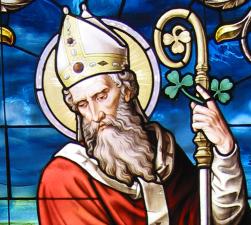 The story goes that somewhere around the year 400 AD, a lad of 16, named Maewyn Succat, was kidnapped by pirates from his home in what is now Wales and was taken as a slave to Ireland. He was enslaved for six years, during which time he converted to Christianity. He finally escaped and returned to his family. He became a priest and studied at a seminary in France. When he was almost 60, he returned to Ireland. By then Pope Celestine I had given him the name “Patercius” or “Patritius.” We know him better these days as Patrick. He did alright in Ireland. He founded over three hundred churches and apparently had a way with snakes. Today is his feast day or as we call it, St. Patrick’s Day.
The story goes that somewhere around the year 400 AD, a lad of 16, named Maewyn Succat, was kidnapped by pirates from his home in what is now Wales and was taken as a slave to Ireland. He was enslaved for six years, during which time he converted to Christianity. He finally escaped and returned to his family. He became a priest and studied at a seminary in France. When he was almost 60, he returned to Ireland. By then Pope Celestine I had given him the name “Patercius” or “Patritius.” We know him better these days as Patrick. He did alright in Ireland. He founded over three hundred churches and apparently had a way with snakes. Today is his feast day or as we call it, St. Patrick’s Day.
Some scholars are skeptical of the story of St. Patrick, which is based largely on the Confessio, a short autobiography. As told by History.com, Roy Flechner, author of Saint Patrick Retold: The Legend and History of Ireland’s Patron Saint, has raised doubts about the legend of the saint’s time in slavery. “The traditional story that Patrick was kidnapped from Britain, forced to work as a slave, but managed to escape and reclaim his status, is likely to be fiction,” he said in a Cambridge University study. “The probability that Patrick managed to cross from his alleged place of captivity in western Ireland back to Britain undetected, at a time when transportation was extremely complicated, is highly unlikely.”
Flechner asserts that rather than coming to Ireland against his will, Patrick deliberately fled to the island to avoid inheriting his father’s job as a Roman tax collector, which was becoming an increasingly dangerous and financially risky job in the collapsing empire since collectors were responsible for making up any shortfalls out of their own pockets. He also argues that rather than being a slave, it was more likely that Patrick was actually a slave trader because he proclaimed himself a wealthy man at a time when Ireland lacked a monetary economy and slave-trading was one of the few lucrative businesses.
Whatever the history may be, Happy St. Patrick’s Day to all.
